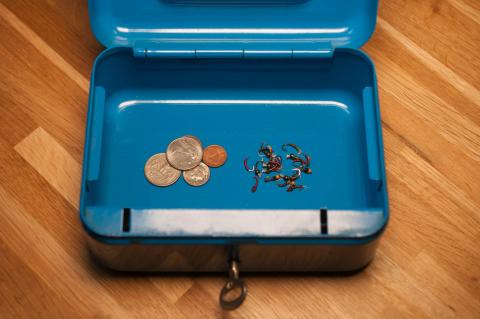I would like to get in touch with the photographer and subject in this image - To get their permission to use this image for a printed advert. Please contact me as soon as possible.
Recent comments
I found the adhesive backed lead in a walomart in the craft section
- Log in to post comments
Christophe,
Thanks for your comment!
The inner tubing is generally available from tube material suppliers. Guideline has a large selection and many dealers all over Europe. There are even a few in France.
You can find them on Guideline's web site.
You can also try ordering online. Canadian Tube Fly Company has a very large selection of materials.
Martin
- Log in to post comments
Hello,
This is really an outstanding exposé about tube flies.
Could you please tell me where we can get tube lining to attach cones on? I have problems finding some.
Many thanks
christophe
- Log in to post comments
Hi just turned my first reel seat down. Now I need to know whats the best paint or cover for it.
Thanks for your help!
PS: This is a wonderfull web site and big help for beginners to start with rod building.
- Log in to post comments
Are there any changes in leader design for women as opposed to men?
- Log in to post comments
What I found I like is a 1/3 each mix of the following: rosin, bee's wax, and toliet seal wax (very cheap, $1.24 for a big block, found at any hardware store). To vary the softness, just add more toliet seal wax, as it is a lot softer than bees wax. You can make a wax that is plenty tacky, but is not so soft like Overton's, which I felt was too soft.
- Log in to post comments
Eric,
If you go to the forum and try to register, you get this message. It contains very clear instructions including a link with my mail-address.
It basically says: Drop me an email at martin@globalflyfisher.com with the subject "GFF, register me" and I'll take care of it. It even has a link to take you directly to your email-program if you use one...
I have you in my queue and will register a few folks including you as soon as this has been submitted.
Martin
- Log in to post comments
In your country is very many stone fly and i will try it on spring....Very realistic patern
- Log in to post comments
i'm trying to register get registered on your site, have not been able to find address for "martin.
kindly advise
- Log in to post comments
I have a "Joe King," a "Trout Rock #1," and one other.
Can you tell me what the value might be.
This is part of a collection from about the 1940"s
Any suggestions would be appreciated
William W. Anderson
- Log in to post comments
Joseph,
I'm glad you like she story. I hope you get to have as much fun on you Cuba trip as I have had on my trips to Mexico and Belize.
Regarding tarpon leaders... I will not claim to be able to teach you to to tie one... they are different beasts!
I have a few lying around, and I might have tied some of them myself, but looking at them has me puzzled how I ever managed to do that! They consist of several sections held together by all sorts of intricate knots of which a couple of Bimini twists seem to be the simple part! And that basically says it. The idea is that you need very thick and strong mono attached to the fly, then you need a flexible and thin part as your so called class tippet (the breaking strength you are fishing with), which again attach to your leader attached to your fly line.
You want the fish to be unable to chew the lower part close to the fly, but able to break the next part, which is neither your leader nor your fly line.
I have sought on the web for a good instruction in tying one as well as run through my well stocked book shelves for a guide, but have found nada! The Bimini twist is easy to find and fairly easy to tie once you have tried it a couple of times, but tying the whole leader is a different issue.
I urge you to find a person who has done it and have him or her show you. Someone in a local club or shop must have the experience. In the meantime I'll try to dig out some instructions for the whole leader and make a properly illustrated article about the materials, process and proper usage. Hopefully before you leave...
Martin
- Log in to post comments
Great pattern and good pics. Thanks! Keep in mind that these types of flies can really be hard on light tippets. They have a tendency to "helicopter" in the wind, twisting the tippet. Thanks again for posting cause I have been struggling to tie this pattern for awhile now!
- Log in to post comments
Hello and thank you for sharing your fantastic trip. I will be leaving at the end of March 2010 with 2 friends to try to accomplish the same thing. We will be arriving Cancun and then flying to Cuba. Mostly chasing Tarpon in the mangroves. I appreciate your comments about Tarpon leaders and letting the hands of experience tie them but I am confused about their composition. eg, how long and what strength is the first section that attaches to the fly line, same for the next section and same for the tippet. I cannot find a pattern or sketch to follow on the net, and no fly shop I have talked to he in British Columbia seems able to help me. You are a great photographer and perhaps you could email me a photo or drawing of these leaders.
Again thanks for sharing,
Regards,
Joe
- Log in to post comments
Peter is the master of alot of great flies! He actually catches BIG fish on them, which is even cooler!!
Rooster
- Log in to post comments
Hi, I love this site and also this fly. I have one question though...why do you use a gold bead instead of a black one? The living larva's head is obviously black.
Thanks for sharing this pattern!
Hi Mike...I usually fish Hillhead and Hayling. Thanks for the info.
Cheers Dave
- Log in to post comments
Terriffic panoramics, the air to breathe is as though you never took a breath before, the euycaliptus smell is awsome, trout are spectacular... the locals true gents
- Log in to post comments
Eugene, so sorry for this staledated reply to yours of over 7 months back! I don't come here as often as I used to.
Unfortunately I'm not the expert on antique tackle. I'd suggest checking with Len Codella or Lang's Auctions to see if they have information.
- Log in to post comments
Magnificent video ! Totally amazing !
Thank you so much for sharing this :)
- Log in to post comments
Jim,
The elastic does not keep any water out. The boot fills with water!
It's the waders that keep out the water. The legs you see continue into the boot and are waterproof, so no wet toes...
Martin
how can that little elastic around the boot keep water out.
Hi Matthew another tool on this web site that I have found is a Leader calculator. It is a wonderful tool available for download.
http://globalflyfisher.com/fishbetter/leadercalc/download.php
- Log in to post comments

